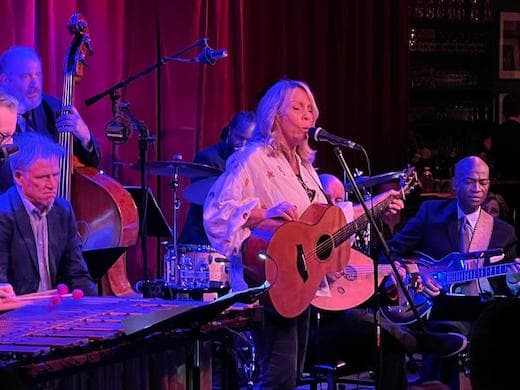Rickie Lee Jones’s Latest Is More About Truth Than Beauty
She’s to be commended for not being tempted to prettify her voice with autotune or other studio trickery, and darned if she doesn’t tell the story.

Rickie Lee Jones
‘Pieces of Treasure’ (BMG Modern Recordings)
She’s feeling so bad, she wants to make the music dreamy and sad. That’s exactly what Rickie Lee Jones does on her new album, “Pieces of Treasure” (officially released on April 28), and what she did this past weekend in previewing the music at Birdland.
Have you met Miss Jones? The highly storied singer-songwriter is no Jennie-come-lately to jazz and standards. Her first album of this material was the 1991 “Pop Pop,” and there are also show tunes side by side with rock classics on the 2000 “It’s Like This.”
It’s unfair to classify “Pieces of Treasure” as part of the continuum of 1970s pop stars who have made Great American Songbook albums, which tend to span the gamut from the merely glib (Rod Stewart) to the completely inept (too many to list). In fact, it’s the polar opposite of Linda Ronstadt’s big-selling trilogy with Nelson Riddle. Those were all shiny surfaces — beautiful arrangements by the great man himself, and Ms. Ronstadt’s voice was peerless and sonically perfect — but the interpretations themselves were almost defiantly shallow and emotionally bereft.
Beyond Ms. Jones herself — still very much a looker at 68 — there’s little that’s conventionally pretty about ”Pieces of Treasure”; it’s more about truth than beauty. Producer Russ Titelman has tied it all together: the playing of her instrumental collaborators here, particularly guitarist Russell Malone and vibraphonist Mike Mainieri, the mostly sad songs, and Ms. Jones’s voice sound of a coherent piece, all in sync with each other. At first the voice seems somewhat dissipated, but upon listening to “Pop Pop” again, it’s clear that she’s hardly changed at all in 30 years.
The mood is similar to Billie Holiday’s 1950s Verve sessions and to Nat King Cole’s 1956 “After Midnight,” except that they did many swinging and uptempo numbers, whereas “Treasure” is all dreamy and sad, way down tempo — there’s little here that you’d want to dance to.
At Birdland, it was a matter of gradually becoming acclimated to Ms. Jones’s sound and her overall approach, in which she’s constantly altering melodies, rhythms, and even lyrics. (For instance, on “Just in Time” she sings “Then I met you” instead of “Nowhere to go.”) She’s not one who’s much for holding a note; oftimes she’ll hit it, and then very audibly slide off. Yet she’s to be commended for not being tempted to prettify her voice with autotune or other studio trickery, and darned if she doesn’t tell the story. On “September Song,” it’s impossible to doubt that she’s lived and suffered every moment of the narrative, every word, every note.
Even the most relatively upbeat song out of the 10 here, “They Can’t Take That Away From Me,” is more bittersweet than cheerful. Perhaps the acid test is “On the Sunny Side of the Street.” Performed as a duo with Mr. Malone, this may be the most melancholy version I’ve ever heard of this usually optimistic jazz perennial from 1930. It’s like she’s telling us that one can’t appreciate the sunny side until one has taken a long walk in the shade. The leap up to the last note on the first line, “grab your coat and get your hat,” is a minor 7th, almost an octave, and when Ms. Jones hits it, it’s like she’s turning on the light in a dark room.
“Nature Boy” becomes an exercise in Middle Eastern mysticism, opening with an elaborate introduction stated on the oud by Ara Dinkjian (who appeared at several sets this past weekend) while Ms. Jones produces a pentatonic moan in the background. At Birdland, she threw in a few songs from “Pop Pop,” including “The Second Time Around” and “Bye Bye Blackbird”; my request would have been for “Hi-Lili, Hi-Lo,” written in the form of a nursery rhyme waltz but which she reimagines as a devastating saloon song on the order of “One For My Baby.” She also gave the full torch treatment to Steely Dan’s “Show Biz Kids,” reprised from “It’s Like This.”
There are multitudes in Ms. Jones’s voice; at Birdland, majordomo Gianni Valenti noted echoes of Sheila Jordan, while others heard Billie Holiday and, on the bluesier songs, something like a female Mose Allison. As for me, I couldn’t help hearing the artist originally known as “Little” Jimmy Scott, particularly in her super slow, halting phrasing.
For nine songs, we take her at face value. We don’t question her pronouncements that it’s essential to love someone “all the way” or that maybe one should save those leftover dreams for the inevitable rainy day. Then, for the last song, “It’s All In The Game,” she changes tactics. Pianist Rob Mounsey plays achingly slowly and somberly, like a priest performing someone’s last rites. Ms. Jones isn’t offering us conclusions here so much as questions, looking inward into her own story for answers that never come.
The very last sound we hear — a few seconds after the final note — is that of Rickie Lee Jones audibly sobbing. Perhaps producer Russ Titelman left that in to suggest that maybe, just maybe, despite what the title and lyrics say, neither of them actually believes that love is merely a game after all.

